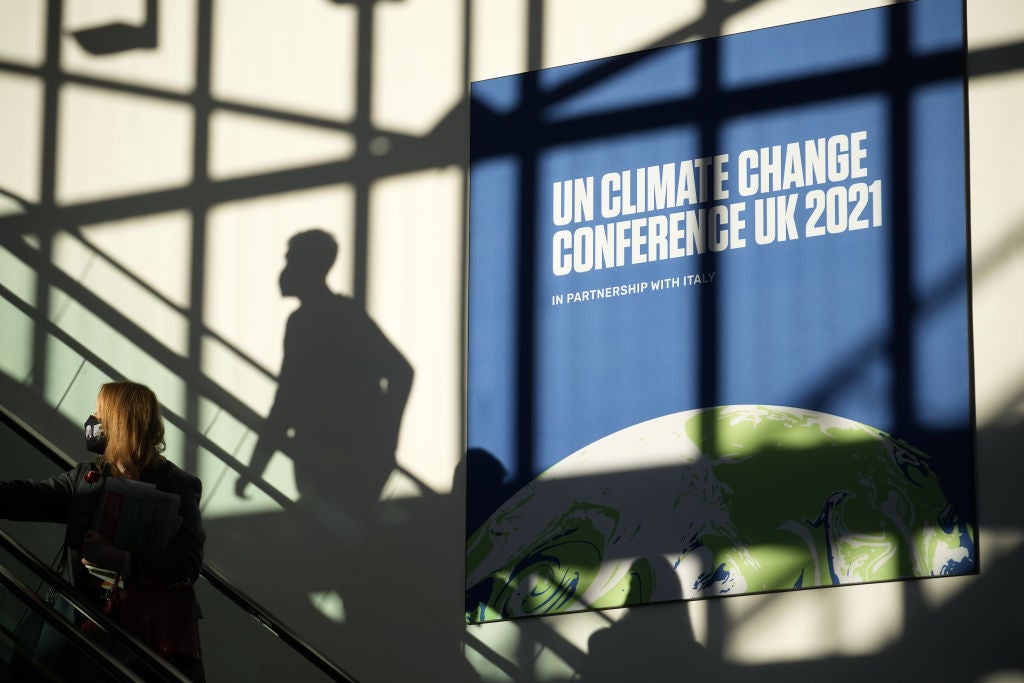Cop26: What happens after world leaders leave the climate summit?
The departure of world leaders sees complex negotiations between countries come to the forefront. Climate correspondent Daisy Dunne explains


It has been an eventful first week at the Cop26 climate summit. The first few days saw world leaders such as President Joe Biden, Canada’s Justin Trudeau and India’s Narendra Modi descend on Glasgow to make new promises on tackling the climate crisis. Mr Modi stole the show on Monday when he announced India would aim for net zero by 2070.
Major deals were secured for deforestation, coal and methane – a potent greenhouse. Cracks have started to appear in these agreements, but they nevertheless represent progress towards tackling some of the major drivers of the climate crisis.
But what happens now that all the world leaders have gone? This is the point where negotiations on the text of the official agreement that will come out of the talks take centre stage, explains Dr Stephen Corenelius, chief adviser on climate change for WWF and a former Cop negotiator for the UK.
“This Cop in Glasgow has had a Leaders Summit, where you had 120-odd leaders come in and make announcements on the things that they’re doing,” he tells The Independent. “At the same time, you have the actual negotiations themselves.”
The negotiations see country representatives work to resolve key issues. These range from the big, such as finalising the details of the landmark Paris Agreement, to mundane details on how countries should be reporting their greenhouse gas emissions.
Negotiations take place in designated rooms inside the conference. “What tends to happen is that negotiators discuss the issues this week, and any that are more difficult and can’t be agreed on will be discussed at a more political level by ministers,” Dr Corenelius says.
A major task for negotiators at Cop26 will be finalising the remaining sticking points in the Paris Agreement’s rulebook, which addresses questions around how countries should formulate their climate plans.
An obscure and highly technical section of the rulebook, known as Article 6, is the last major puzzle piece to be resolved. It covers rules for carbon markets and other types of international cooperation.
Negotiators failed to agree on the rules for Article 6 at the last UN climate conference in Madrid in 2019. With different countries taking different positions on how the matter should be resolved, it will not be easy for negotiators to resolve the matter in Glasgow.
Another major issue is finance. Back in 2009, rich nations promised to provide poorer countries with $100bn (£74bn) a year by 2020 to help them transition to low-carbon economies and to deal with escalating climate impacts.
However this deadline was missed, providing a difficult backdrop for further discussions around what sort of funding should be secured for post-2025.
An additional major talking point is the Paris Agreement’s aspiration to limit global temperature rise to 1.5C above pre-industrial levels. Back in August, a landmark climate report warned the temperature goal risked slipping beyond reach if countries did not take urgent action.
Juan Pablo Osornio, head of Greenpeace’s delegation at Cop26, said that the final agreement from Glasgow must retain the commitment to limit temperatures to 1.5C.
“Crucially the official Cop26 Glasgow Agreement text must keep the goal of limiting warming to 1.5C,” he tells The Independent. “Anything less would be a complete failure and a dereliction of responsibility from world leaders.”
Join our commenting forum
Join thought-provoking conversations, follow other Independent readers and see their replies
Comments
Bookmark popover
Removed from bookmarks